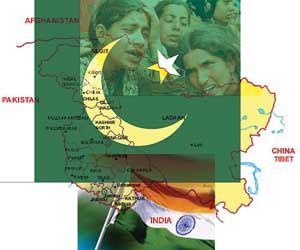Campus group plans events to investigate India, Pakistan’s conflict over Kashmir
By Josh SchonwaldNews Office
 | |
A series of campus events during Spring Quarter will investigate the region at the center of one of the world’s most volatile conflicts: the dispute between India and Pakistan over Kashmir.
Created by the campus group South Asia Watch, the Kashmir Project at the University aims to foster understanding of this South Asian region’s history, politics and culture at a critical time.
While India and Pakistan have disputed the mountainous Kashmir region since 1947, in recent years the conflict has worsened. The two countries maintain massive armies on both sides of what is called the “Line of Control.” In 1998, tensions further escalated when the two nuclear powers conducted tit-for-tat nuclear tests. Although there has been some progress toward peace in the region, some observers fear that even a minor incident along the border could trigger a massive war between the two nuclear-capable nations.
During the Spring term, the Kashmir Project plans to sponsor three events to focus on the current climate in Kashmir, its history, its cultural legacy and its future.
What makes this particular series so unique, said Ian Desai, a fourth-year in the College and the chief organizer of the project, is its focus on the historical and cultural context of the Kashmir conflict. “Kashmir has been a hot topic recently,” said Desai, “but so much of the conversation has focused on the political dynamics of the region.” By tapping into the wide range of experts and resources available at Chicago, the Kashmir Project aims to provide a multifaceted look at the conflict, Desai said.
In March, the project is sponsoring a Kashmir film screening, featuring some of the most important fiction and nonfiction films that have been shot in Kashmir. The film screening will take place Wednesday, March 31, with the film titles and location to be announced.
On Friday, April 9, a panel discussion titled “Religion and Identity” will bring together scholars from around the country to discuss the role religion has played in shaping the region’s social and political identity. Later in April, the Kashmir Project will sponsor the “Kashmir Roundtable: Assessing Alternatives for the Future.”
Desai acknowledged the sensitivities surrounding the Kashmir dispute, but hopes that these events “will promote lively, yet healthy discussion” of the region’s history and the current conflict.
The Kashmir Project, which is being co-sponsored by the Center for International Studies Norman Wait Harris Fund, the Committee on South Asian Studies and South Asia Watch, held its first two lectures in February.
The first event, “Kashmir: A Cultural and Historical Perspective,” explored the overlapping social, cultural and historical elements that define the region. Ronald Inden, Professor in History, South Asian Languages & Civilizations and the College, focused on Kashmir’s cultural legacy, discussing an idea that has, throughout history, described Kashmir as “heaven on Earth.” Indiana University’s Sumit Ganguly also presented a historical analysis of the political situation in the region.
In another February lecture, “Literary Traditions of Kashmir,” Sanskrit scholar Arshia Sattar attempted to unravel the cultural and historical complexities of the region through a reading and exploration of the magical tales of the Kathasaritsagara, a collection written around 1070 C.E. These magical fairy tales provide important insights into the culture of Kashmir.
Information from these two earlier lectures will be catalogued on the Web, said Desai. “We hope the lecture material will be a permanent resource for the study of Kashmir.”
More information on the Kashmir Project may be obtained on the Web site of the Center for International Studies, http://internationalstudies.uchicago.edu, or by contacting Desai at iand@uchicago.edu.
![[Chronicle]](/images/sidebar_header_oct06.gif)